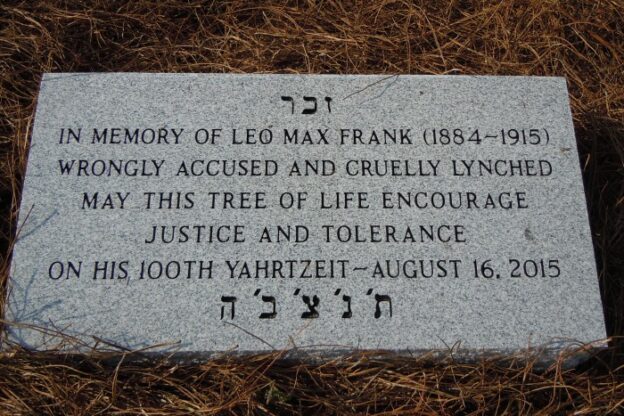Last week, President Biden issued a presidential proclamation recognizing the horrific injustice that was the murder of Emmett Till, a 14-year-old whose brutal killing in Mississippi in 1955 helped galvanize the civil rights movement. A national monument is being created in honor of the murdered boy and his mother, Mamie Till Mobley, who forced the nation to confront the horror of what happened to her son.
What the revisiting of that evil brought to my mind was another lynching, of a Jewish man in Georgia decades earlier, in 1915. The murder of Leo Frank is a sad part of American history that should not be forgotten.
On April 26, 1913, a 13-year-old girl on her way to Atlanta’s Confederate Memorial Day parade stopped at her place of employment, the National Pencil Company, to collect her paycheck. The next day, she was found murdered in the factory’s basement.
Leo Frank, a 29-year-old Jewish man, was working at the factory that morning and handed the girl her pay. He was the last person to see her and so, when the murder was discovered the next morning, he came under suspicion and was arrested and jailed.
Police, however, had another suspect. Jim Conley, a custodian at the factory, who a witness saw in the factory basement washing out a shirt soaked with what appeared to be blood. Notes, filled with misspellings, were found alongside the murdered girl and Jim Conley was questioned.
After two weeks, he finally admitted writing the notes but said that Leo Frank had asked him to, and had confessed to the murder.
Conley signed contradictory affidavits, which were entered into the trial of Leo Frank. But the glaring inconsistencies were ignored by the jury.
As the trial took place, crowds gathered outside the courthouse chanting “Hang the Jew!”
Based on Conley’s claim and with no real evidence to implicate Frank, the four-week trial ended with a guilty verdict. Outside the courthouse, the crowd cheered the announcement. According to the New-York Tribune, the prosecuting attorney “was lifted to the shoulders of several men and carried more than a hundred feet through the shouting throng.”
The presiding judge, Leonard Roan, sentenced Frank to death by hanging. Appeals ensued for two years. And even after Conley’s former attorney said he believed his former client was the actual murderer, a retrial motion was also rejected.
The case ended up before the U.S. Supreme Court, which, in a 7-2 ruling, allowed Frank’s conviction to stand. Justices Oliver Wendall Holmes and Charles Evan Hughes dissented, stating that the hostility outside the courthouse influenced the conviction.
Georgia Governor John Slaton conducted his own extensive investigation into the case, and, on June 21, 1915, the day before Frank’s execution was to take place, commuted his sentence to life in prison. The governor wrote that “I would rather be plowing in a field than to feel that I had that blood on my hands.”
The community was outraged and Governor Slaton, whose term ended shortly thereafter, fled Georgia with his wife, fearful of the retribution local citizens might visit upon him for keeping the Jew alive.
On August 17, 1915, a mob of 25 men overpowered the guards at the prison farm where Frank was held and kidnapped him. They drove him some 100 miles to a grove near Marietta, handcuffed and hanged him. An approving crowd of some 3000 Georgians, including prominent local citizens, flocked to the lynching site, collecting souvenirs and taking photographs.
Nearly 70 years after the girl’s murder, on March 7, 1982, it was reported that Alonzo Mann, Leo Frank’s office boy, who was fourteen at the time of the killing, said that Conley had murdered the girl, and that he saw the custodian holding her. “If you ever mention this, I’ll kill you,” Conley had told him. Mann said that when he told his mother what he had seen, she told him to keep quiet. He did.
The new evidence led the Georgia Board of Pardons and Paroles to issue a pardon for Leo Frank – but only based on the state’s failure to protect him while in custody and for not bringing his murderers to justice. It did not, however, exonerate the innocent man.
A jury and judge, after all, had spoken.
© 2023 Ami Magazine









